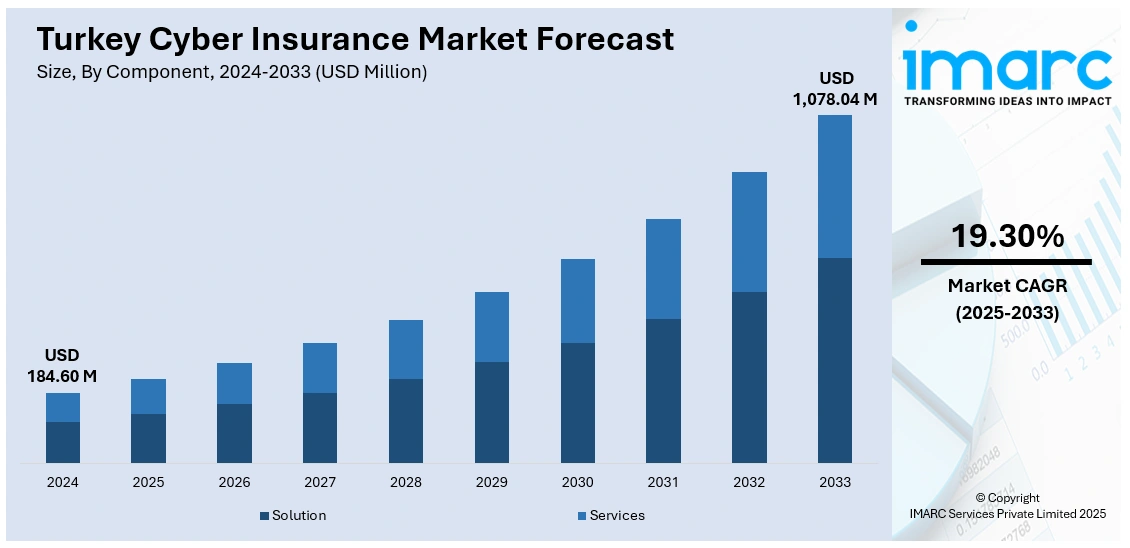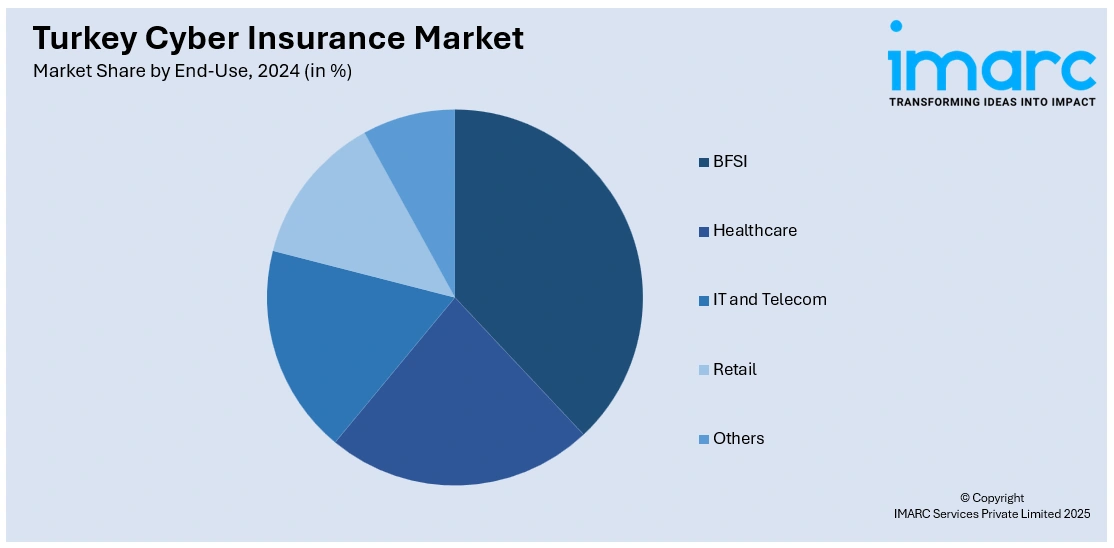
Turkey Cyber Insurance Market Size, Share, Trends and Forecast by Component, Insurance Type, Organization Size, End-Use Industry, and Region, 2025-2033
Turkey Cyber Insurance Market Overview:
The Turkey cyber insurance market size reached USD 184.60 Million in 2024. Looking forward, IMARC Group expects the market to reach USD 1,078.04 Million by 2033, exhibiting a growth rate (CAGR) of 19.30% during 2025-2033. Regulatory changes and the enforcement of more stringent data protection regulations are serving as another key factor supporting the market growth. Moreover, the growing number of sophistications in cyberattacks is offering a favorable market outlook. Apart from this, the consistent move towards digitalization and the embrace of cloud-based solutions are expanding the Turkey cyber insurance market share.
|
Report Attribute
|
Key Statistics
|
|---|---|
|
Base Year
|
2024
|
|
Forecast Years
|
2025-2033
|
|
Historical Years
|
2019-2024
|
| Market Size in 2024 | USD 184.60 Million |
| Market Forecast in 2033 | USD 1,078.04 Million |
| Market Growth Rate 2025-2033 | 19.30% |
Turkey Cyber Insurance Market Trends:
Growing Frequency and Advanced Nature of Cyberattacks
The Turkish cyber insurance sector is driven by the growing number of and sophistication in cyberattacks that have been hitting businesses from various industries. Organizations are relentlessly facing phishing attacks, ransomware attacks, and data leaks that have been causing substantial financial and reputational losses. Cybercriminals are using sophisticated tools and methods, and it has become difficult for companies to protect their systems using conventional security tools alone. As digitalization is growing in Turkey, attack surfaces are broadening, providing more avenues for cyber adversaries to take advantage of vulnerabilities. Small and medium-sized businesses, which are becoming a significant component of Turkey's economy, are being especially exposed with limited cybersecurity assets. As these threats are also continuing to grow, companies are realizing cyber insurance is becoming a critical risk mitigation tool for reducing financial exposure. This sustained trend is continuously driving demand for full cybersecurity insurance policies throughout the Turkish market. In 2025, Turkish software and defense leader Havelsan created a closed-loop, secure artificial intelligence (AI) system named MAIN, which serves as a corporate substitute for open AI platforms such as ChatGPT and Gemini, while protecting sensitive institutional information, a company representative informed Anadolu.

To get more information on this market, Request Sample
Growing Digitalization and Cloud Service Adoption
The consistent move towards digitalization and growing embrace of cloud-based solutions are constantly fueling the need for cyber insurance in Turkey. Companies from various sectors are shifting towards cloud technology for ease, economic benefits, and flexibility, but this digitalization is, at the same time, exposing them to greater cyber vulnerabilities. Personal information is stored and processed in interconnected systems, thus being more prone to breaches and unauthorized usage. With the private sector and government investing heavily in digital infrastructure and e-governance initiatives, dependence on secure digital platforms is increasing at a very fast rate. But this dependence is constantly creating new vulnerabilities that are being targeted by cybercriminals. Organizations find that conventional cybersecurity measures are not enough to support the financial losses of cyber events and are thus looking towards insurance as an essential measure.
Strengthening Regulatory Frameworks and Data Protection Laws
Regulatory changes and the enforcement of more stringent data protection regulations are serving as another key factor supporting the Turkey cyber insurance market growth. The passage and implementation of Turkey's Personal Data Protection Law (KVKK) are generating new compliance mandates for firms that are dealing with sensitive personal data. Firms are being required to guarantee data protection, disclose breaches, and undertake protective measures against cybercrime. Non-compliance is resulting in financial penalties, legal consequences, and reputational damage, which is prompting organizations to look for insurance coverage that can help mitigate these risks. At the same time, regulatory bodies are encouraging stronger corporate governance practices in relation to cybersecurity, which is increasing awareness of potential liabilities. As companies are working to comply with these changing legal requirements, the need for cyber insurance products that include regulatory fines, legal fees, and breach management is increasingly on the rise in Turkey. In 2025, The Turkish Parliament passed a new cybersecurity law, which introduced new government oversight methods and expands the authorities of the Cybersecurity Directorate established by President Recep Tayyip Erdoğan.
Turkey Cyber Insurance Market Segmentation:
IMARC Group provides an analysis of the key trends in each segment of the market, along with forecasts at the country and regional levels for 2025-2033. Our report has categorized the market based on component, insurance type, organization size, and end-use industry.
Component Insights:
- Solution
- Services
The report has provided a detailed breakup and analysis of the market based on the component. This includes solution and services.
Insurance Type Insights:
- Packaged
- Stand-alone
A detailed breakup and analysis of the market based on the insurance type have also been provided in the report. This includes packaged and stand-alone.
Organization Size Insights:
- Small and Medium Enterprises
- Large Enterprises
The report has provided a detailed breakup and analysis of the market based on the organization size. This includes small and medium enterprises and large enterprises.
End-Use Industry Insights:

- BFSI
- Healthcare
- IT and Telecom
- Retail
- Others
A detailed breakup and analysis of the market based on the end-use industry have also been provided in the report. This includes BFSI, healthcare, IT and telecom, retail, and others.
Regional Insights:
- Marmara
- Central Anatolia
- Mediterranean
- Aegean
- Southeastern Anatolia
- Black Sea
- Eastern Anatolia
The report has also provided a comprehensive analysis of all the major regional markets, which include Marmara, Central Anatolia, Mediterranean, Aegean, Southeastern Anatolia, Black Sea, and Eastern Anatolia.
Competitive Landscape:
The market research report has also provided a comprehensive analysis of the competitive landscape. Competitive analysis such as market structure, key player positioning, top winning strategies, competitive dashboard, and company evaluation quadrant has been covered in the report. Also, detailed profiles of all major companies have been provided.
Turkey Cyber Insurance Market Report Coverage:
| Report Features | Details |
|---|---|
| Base Year of the Analysis | 2024 |
| Historical Period | 2019-2024 |
| Forecast Period | 2025-2033 |
| Units | Million USD |
| Scope of the Report |
Exploration of Historical Trends and Market Outlook, Industry Catalysts and Challenges, Segment-Wise Historical and Future Market Assessment:
|
| Components Covered | Solution, Services |
| Insurance Types Covered | Packaged, Stand-alone |
| Organization Sizes Covered | Small and Medium Enterprises, Large Enterprises |
| End-Use Industries Covered | BFSI, Healthcare, IT and Telecom, Retail, Others |
| Regions Covered | Marmara, Central Anatolia, Mediterranean, Aegean, Southeastern Anatolia, Black Sea, Eastern Anatolia |
| Customization Scope | 10% Free Customization |
| Post-Sale Analyst Support | 10-12 Weeks |
| Delivery Format | PDF and Excel through Email (We can also provide the editable version of the report in PPT/Word format on special request) |
Key Questions Answered in This Report:
- How has the Turkey cyber insurance market performed so far and how will it perform in the coming years?
- What is the breakup of the Turkey cyber insurance market on the basis of component?
- What is the breakup of the Turkey cyber insurance market on the basis of insurance type?
- What is the breakup of the Turkey cyber insurance market on the basis of organization size?
- What is the breakup of the Turkey cyber insurance market on the basis of end-use industry?
- What is the breakup of the Turkey cyber insurance market on the basis of region?
- What are the various stages in the value chain of the Turkey cyber insurance market?
- What are the key driving factors and challenges in the Turkey cyber insurance market?
- What is the structure of the Turkey cyber insurance market and who are the key players?
- What is the degree of competition in the Turkey cyber insurance market?
Key Benefits for Stakeholders:
- IMARC’s industry report offers a comprehensive quantitative analysis of various market segments, historical and current market trends, market forecasts, and dynamics of the Turkey cyber insurance market from 2019-2033.
- The research report provides the latest information on the market drivers, challenges, and opportunities in the Turkey cyber insurance market.
- Porter's five forces analysis assist stakeholders in assessing the impact of new entrants, competitive rivalry, supplier power, buyer power, and the threat of substitution. It helps stakeholders to analyze the level of competition within the Turkey cyber insurance industry and its attractiveness.
- Competitive landscape allows stakeholders to understand their competitive environment and provides an insight into the current positions of key players in the market.
Need more help?
- Speak to our experienced analysts for insights on the current market scenarios.
- Include additional segments and countries to customize the report as per your requirement.
- Gain an unparalleled competitive advantage in your domain by understanding how to utilize the report and positively impacting your operations and revenue.
- For further assistance, please connect with our analysts.
 Request Customization
Request Customization
 Speak to an Analyst
Speak to an Analyst
 Request Brochure
Request Brochure
 Inquire Before Buying
Inquire Before Buying




.webp)




.webp)












